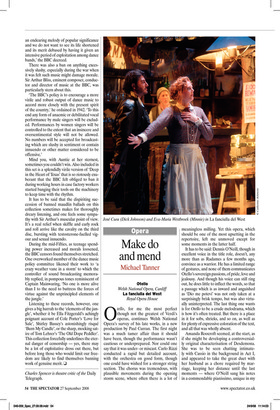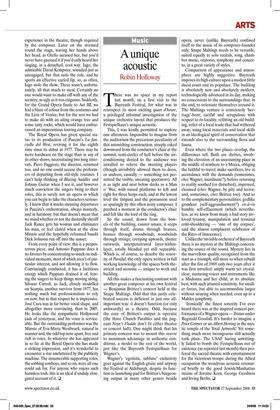Make do and mend
Michael Tanner
Otello Welsh National Opera, Cardiff La fanciulla del West Royal Opera House
Otello, for me the most perfect though not the greatest of Verdi’s operas, continues Welsh National Opera’s survey of his late works, in a new production by Paul Curran. The first night was a much tamer affair than it should have been, though the performance wasn’t cautious or underprepared. Nor could one say that it was underor miscast. Carlo Rizzi conducted a rapid but detailed account, with the orchestra on good form, though one could have wished for a stronger string section. The chorus was tremendous, with plausible movements during the opening storm scene, where often there is a lot of meaningless milling. Yet this opera, which should be one of the most upsetting in the repertoire, left me unmoved except for some moments in the latter half.
It has to be said: Dennis O’Neill, though in excellent voice in the title role, doesn’t, any more than as Radames a few months ago, convince as a warrior. He has a limited range of gestures, and none of them communicates Otello’s sovereign passions, of pride, love and jealousy. And though his voice can still ring out, he does little to inflect the words, so that a passage which is as inward and anguished as ‘Dio me potevi’ was not only taken at a surprisingly brisk tempo, but was also virtually uninterpreted. The last thing one wants is for Otello to be a crude melodrama, which is how it’s often treated. But there is a place in it for sobs, shrieks, and so on, as well as for plenty of expressive coloration of the text, and all that was wholly absent.
Amanda Roocroft seemed, at the start, as if she might be developing a controversially original characterisation of Desdemona. She was to be seen chatting intimately with Cassio in the background in Act I, and appeared to take the great duet with her husband as a chore required by marriage, keeping her distance until the last moments — where O’Neill sang his notes in a commendable pianissimo, unique in my experience in the theatre, though required by the composer. Later on she stormed round the stage, waving her hands above her head, as Otello accused her, but you’d never have guessed it if you’d only heard her singing, in a detached, cool way. Iago, the admirable David Kempster, sounded just as unengaged, but that suits the role, and he sports an effective curled lip, so, as often, Iago stole the show. There wasn’t, unfortunately, all that much to steal. Certainly no one would want to make off with any of the scenery, as ugly as it was exiguous. Suddenly, for the Grand Opera finale to Act III, we had a blaze of colour from the costumes and the Lion of Venice, but for the rest we had to make do with an ailing orange tree and some tatty rocks, which would have embarrassed an impecunious touring company.
The Royal Opera has given special status to its production of Puccini’s La fanciulla del West, reviving it for the eighth time since its debut in 1977. There may be more hardware on the stage than in any of its other shows, necessitating two long intervals. Piero Faggioni, the director, returned too, and no one could accuse the performers of departing from old-style routines. I can’t help thinking of Blazing Saddles and Johnny Guitar when I see it, and however much conviction the singers bring to their roles, this is surely not an opera in which you can begin to take the characters seriously. I know that it marks stunning departures in Puccini’s orchestration, always masterly, and in harmony, but that doesn’t mean that we mind whether or not the dastardly sheriff Jack Rance gets his woman and eliminates his man, or feel elated when at the close Minnie and the hopefully reformed bandit Dick Johnson run off into the sunset.
From every point of view, this is a preposterous piece, and Antonio Pappano does it no favours by concentrating so much on individual moments, most of which aren’t of particular interest, and not allowing it to flow. Convincingly conducted, it has a factitious energy which Pappano drained it of, leaving the singers to keep things moving along. Silvano Carroli, as Jack, closely modelled on Scarpia, another survivor from 1977, has nothing much but professionalism to rely on now, but in that respect he is impressive. José Cura was in far better vocal shape, and altogether more convincing, than in 2005. He looks like the sympathetic Hollywood cads of yesteryear, and his voice is serviceable. But the outstanding performer was the Minnie of Eva-Maria Westbroek, natural in manner and, the odd top note apart, free and rich in voice. In whatever she has appeared in so far at the Royal Opera she has made a striking impression, and it’s wonderful to encounter a star uncluttered by the publicity machine. The innumerable supporting roles, the sobbing cowboys, and so on, were all one could ask for. For anyone who enjoys such harmless tosh, this is an ideal if unduly elongated account of it. ❑











































































 Previous page
Previous page